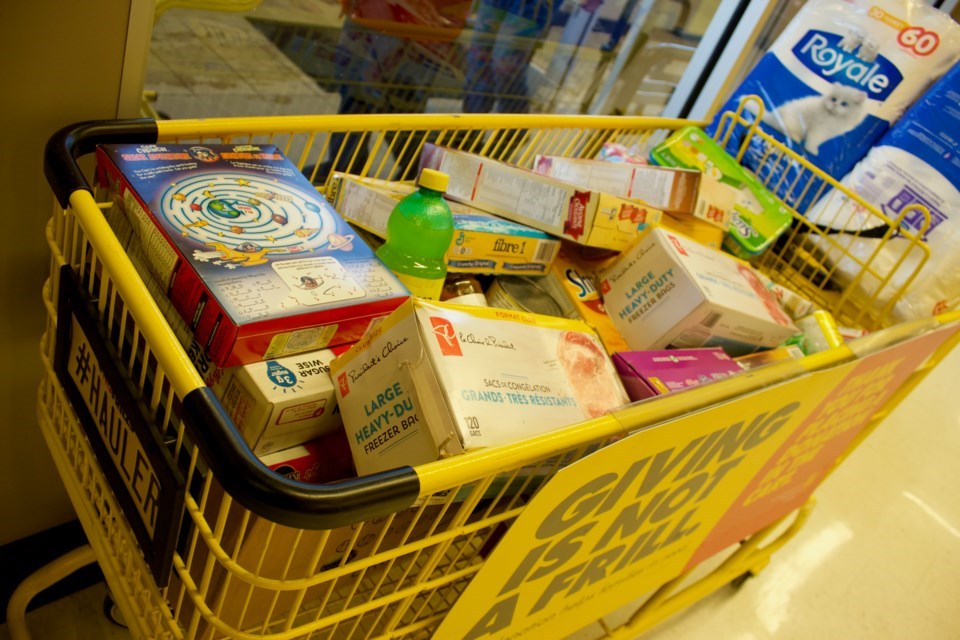It's a short-term solution that doesn't solve a long-term problem.
That's what Bradford Helping Hand Food Bank Executive Director, Carolyn Khan says about a new, targeted inflation relief program to help 11 million low- and modest-income Canadians and families save money on groceries.
The federal budget, tabled Tuesday, introduced the grocery rebate to provide eligible couples with two children up to an extra $467 delivered through the Canada Revenue Agency as soon as possible after the legislation passes. Single Canadians without children can qualify for an extra $234, while seniors can get an average of $225. Overall, the one-time rebate is expected to cost $2.5 billion.
The new grocery rebate is intended to "help make up for higher prices at the checkout counter — without adding fuel to the fire of inflation," according to Finance Minister Chrystia Freeland.
Khan says it likely won't make much of a difference for someone living in poverty.
"People living in poverty do need help to buy groceries, but what good is a $200 cheque if you don't have a house to bring that food home to?" said Khan. "Investment in affordable housing has got to be on the forefront of the agenda for all levels of government."
Many Bradford residents are definitely feeling the pinch. Shaina Pirri said the rising cost of food has been a struggle.
"Having to feed a family of five, and telling our children they can’t have something because it’s not on sale or it costs too much is difficult," said Pirri. "Our kids love salad, but when salad costs $8, I can’t justify paying that ridiculous price. It’s honestly depressing going into a grocery store."
Marilyn Bruzzese agreed and said the rising prices have changed the way she shops and cooks.
"I’m way more conscious of food waste and I also look for more sales, especially to donate to food programs," explained Bruzzese. "I find it interesting that they are posting record profits while claiming price increases are due to inflation. I’m not buying it," she added.
Tyler Joseph said household expenses and rent take up the majority of his finances and the rising food costs has become overwhelming.
"My partner and I have struggled with grocery shopping since things began to open after the multitude of lockdowns and still deal with challenges of price over need," he said. "I believe that this rebate will help, but only by a minimal amount. The way we desire a healthier diet, it seems we are forced to really decide on lower-quality products to make ends meet."
March is Hunger Count month at Food Banks Canada. Every year, local food banks record the number of client visits in March, and compare them to previous years to see the impact they've had on alleviating food insecurity. The organization said it’s been a tough year for those who struggle with hunger and "we’re fearful of what’s ahead."
Nearly 1.5 million Canadians accessed a food bank in 2022, with almost 500,000 of them being children. Food Banks Canada says, according to a survey it conducted, the top three reasons people turned to a food bank were food costs, low provincial social assistance rates and housing costs.
Khan said Helping Hand expects to see record high visits this month.
"The month isn't over yet and we have seen over 450 families come for food and we still have two more client shifts before the end of the month."
She said the food bank could potentially see over 500 families this month. In comparison, it saw 327 families in March 2022 and 281 families in March 2021.
"That's a difference of 119 families over a two-year period, and we are continuing to see new faces each time we are open," said Khan. "Something has got to give. Food banks cannot sustain this type of growth, and, in fact, were never designed to in the first place."
Currently, Khan says she has never seen Helping Hand's shelves so empty.
"We are low on almost everything: Kraft Dinner, tuna, baked beans, pasta sauce, rice, granola bars, juice boxes, peanut butter, canned vegetables...all staples in most of our kitchens," she said. "We did do well with our winter fundraising, and we are grateful for the donors in our community - Bradford is truly a little town with the biggest heart - but we need those funds to buy more food than ever before."
According to Statistics Canada, the cost of groceries in February rose 10.6 per cent compared with a year before, slightly down from an 11.4 per cent year-over-year increase in January.
Khan said if food prices continue to rise the food bank will have to make the tough decision to cut back on the amount of food that it offers its clients.
"Food costs have impacted us too, as our new normal means that we are buying almost all of the food we provide to our clients," Khan explained. "It used to be that we were supplemented by school and community food drives, but as food prices skyrocket, people can barely afford to feed their own families, never mind buying food for food banks."
While the federal government's grocery rebate may provide a bit of relief for some, Joseph says it simply doesn't go far enough.
"I don’t know what more needs to be done, per se, but I know that more does need to be done."
More information on Helping Hand Food Bank, including how you can donate can be found here.
With files from Jonathan Volpe



